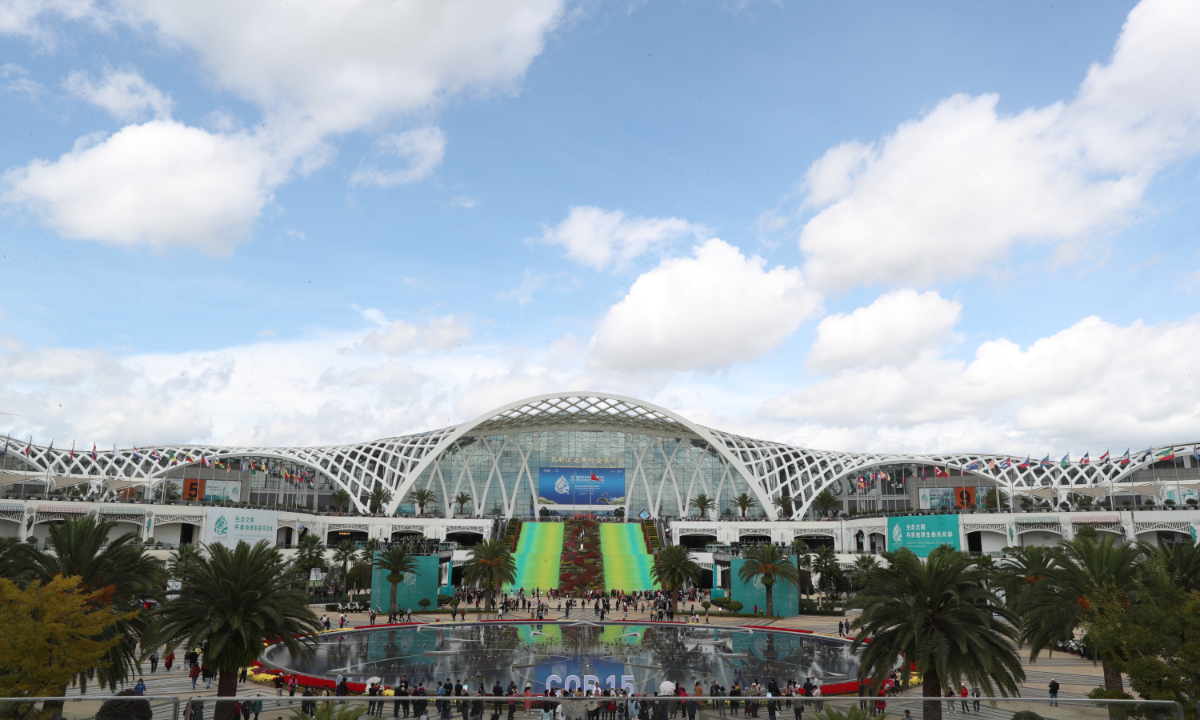
People gather at the Kunming Dian-chi International Convention & Exhibition Center, a venue of the first phase of the 15th meeting of the Conference of the Parties to the United Nations Convention on Biological Diversity (COP15) in Kunming, Southwest China’s Yunnan Province. The second phase of the COP15 will be held in Montreal, Canada in Dcember. File photo: VCG
The second part of the Conference of the Parties (COP15) to the UN Convention on Biological Diversity (CBD) - one of the world's most important multilateral biodiversity events - will soon start in Montreal, Canada, with China as chair. The conference is widely believed to have the potential to be a "Paris moment" for nature, as it is expected to agree on a global biodiversity framework for the coming decade that will live up to global expectations.
The second part of the COP15, scheduled for December 7-19, under the theme of "Ecological Civilization: Building a Shared Future for All Life on Earth," is tasked with formulating and adopting the post-2020 Global Biodiversity Framework (GBF), which should ensure biodiversity loss is halted and reversed by 2030, and that we live in harmony with nature by 2050, said Huang Runqiu, China's Minister of Ecology and Environment and COP15 president. He said that China has exercised leadership and coordination in its efforts to advance negotiations for the framework.
At least 96 ministers and over 10,000 registered delegates are confirmed to be participating in the second part of COP15, the Xinhua News Agency reported last month, citing UN officials.
"Holding the COP15 Presidency, China is responsible for the substantive and political affairs of the conference," Huang noted.
So far, China has convened 37 COP15 meetings of the presidium. It has also presided over four meetings of the open-ended working group on the post-2020 GBF in Geneva and Nairobi, among other locations, in collaboration with the CBD secretariat, Huang said.
Moreover, China has made use of gatherings such as the UN High-level Political Forum on Sustainable Development, the G20 Joint Environment and Climate Ministerial Meeting, the high-level week of the 77th session of the UN General Assembly, and the climate COP27, to organize exchanges on key COP15 issues, Huang said.
These efforts have both maintained the political momentum of COP15 and facilitated the bridging of differences among contracting parties to achieve greater consensus.
It is undeniable that differences on the issues remain an enormous challenge for the contracting parties.
The Global Times learned that almost all the 20 indicators formulated by the Aichi Biodiversity Targets that were supposed to have been met by 2020 have not been completed, and the participating parties are not satisfied with that. Therefore, now the parties have agreed that a framework for the future decade is needed, analysts said.
However, to reach the new framework, the contradiction between developing and developed countries is still sharp and antagonistic. The divergences are revealed in issues such as funding, genetic resources and enforcement and oversight mechanisms, which will also be the focuses and difficulties during the negotiations at COP15, the Global Times learned.
Although there are still many difficulties and demands, all parties have expressed their firm political support and confidence in the negotiation process and in China's role as COP15 president, Huang said.
He said that all countries should shoulder international responsibilities commensurate with their development levels. "Developed countries should fulfill the obligations stipulated in the CBD and related protocols and provide more support for developing countries with regard to funding, technology and capacity-building to make up for the gap in biodiversity governance capability among nations," Huang said.
"In terms of funds, technology, and talent, as one of the countries with the richest biodiversities in the world, China has conscientiously implemented the Aichi Biodiversity Targets, clarified various tasks and responsibilities, and achieved positive results in the implementations," Cui Shuhong, director of the Department of Nature and Ecology Conservation at the Ministry of Ecology and Environment, said at the ministry's press conference on November 28.
The first part of COP15 was held in October 2021 in Kunming, China. The Kunming Declaration was adopted during the conference and was hailed as a major milestone achievement.
This time, the second part was postponed and relocated to Canada due to the COVID-19 pandemic, the Xinhua News Agency reported in June 2022.
Relocating the second part of the conference to Montreal is a decision made under a difficult situation, showing China's sense of responsibility and duty on this issue, according to the Ministry of Ecology and Environment.
Climate change and other ecosystem issues are universal security challenges, and both China and Canada are responsible to work together to deal with the issues. The fact that China is hosting this conference in Canada shows its responsible attitude and the willingness to cooperate with Canada and the rest of the international community on the issues, Li Haidong, a professor from the Institute of International Relations at the China Foreign Affairs University in Beijing, told the Global Times on Monday. The expert noted that the two countries have long collaborated on environmental projects.
Although some conservative politicians in Canada lack independence and blindly follow the US in containing and smearing China, Canada's extensive and profound social and economic relations with China determine that there is no market for any Canadian politician to try to cater to the US at the expense of the whole China-Canada relations and the common economic and social interests of China and Canada, Li pointed out.
I believe that Trudeau, as Canadian prime minister, will have basic judgment and a clear head on matters related to the conference, fully cooperate with China's leadership on substantive and political affairs of the conference, and create more room for the turnaround of China-Canada relations, Li said.




